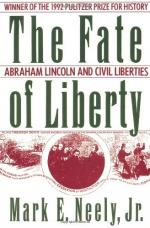
|
| Name: _________________________ | Period: ___________________ |
This quiz consists of 5 multiple choice and 5 short answer questions through Chapter 7.
Multiple Choice Questions
1. Who sets John Eitel's bail in Chapter 5?
(a) Ulysses S. Grant.
(b) President Lincoln.
(c) Edwin M. Stanton.
(d) Charles A. Dana.
2. In the "White Flag Affair," how does Union General Christopher C. Augur convince three Confederates to release his captured Union soldiers?
(a) By holding their eldest sons hostage.
(b) By holding their wives hostage.
(c) By threatening to burn their farms.
(d) By holding their fathers hostage.
3. What is the result of Brigadier General Thomas Ewing's General Order No. 11?
(a) 20,000 citizens are banished from the state of Missouri.
(b) 13,433 citizens of Missouri are arrested by Union forces.
(c) 237 civillians from Missouri are executed by Union soldiers.
(d) Military execution of civilian spies is abolished.
4. Which book of John A. Marshall's is well read among Lincoln's critics?
(a) The Prisoner of State.
(b) The American Bastile.
(c) Low Tide for Liberty.
(d) The Merryman.
5. What war time legal practice is revived due to the rise of guerilla warfare in America?
(a) Military commissions.
(b) Seizure of property.
(c) Execution squads.
(d) Hangings.
Short Answer Questions
1. What is the name of the military strategy which orders the complete destruction of enemy property or resources?
2. In Chapter 5, what does Pardon Worsley convince clerks from several prominent businesses that he has the permits and power to do?
3. Why does General William S. Harney refuse to release Captain Emmett McDonald?
4. What are the most common reasons for civilian arrest between 1863 and 1864?
5. Why does Clement L. Vallandigham's arrest cause widespread Democratic protests?
|
This section contains 319 words (approx. 2 pages at 300 words per page) |

|




